Contents
- Player Positions and Officials
- The Rules of the Game
- Actions During Gameplay
- Parts of the Stadium
- Scoring Vocabulary
- Soccer/Football Equipment
- League and Game Structure
- Vocabulary for Soccer Commentary
- Vocabulary for Soccer Tournaments
- English Phrases to Talk About Soccer with Friends
- And One More Thing...
105 Essential Soccer/Football Vocabulary Words in English [With Audio]

Soccer (or football if you’re outside the United States) is the most popular sport in the world in terms of its number of fans.
If you’re one of its billions of supporters, you may want to learn some English vocabulary to be able to talk about various aspects of the game.
In this article, you’ll learn 105 words and phrases you need to know to communicate about the rules of the game, scoring, tournaments and more. Some of this vocab is also covered in this video from our YouTube channel:
With this key soccer vocabulary, you can get in the game and connect with English speakers over a globally beloved sport!
Download: This blog post is available as a convenient and portable PDF that you can take anywhere. Click here to get a copy. (Download)
Player Positions and Officials
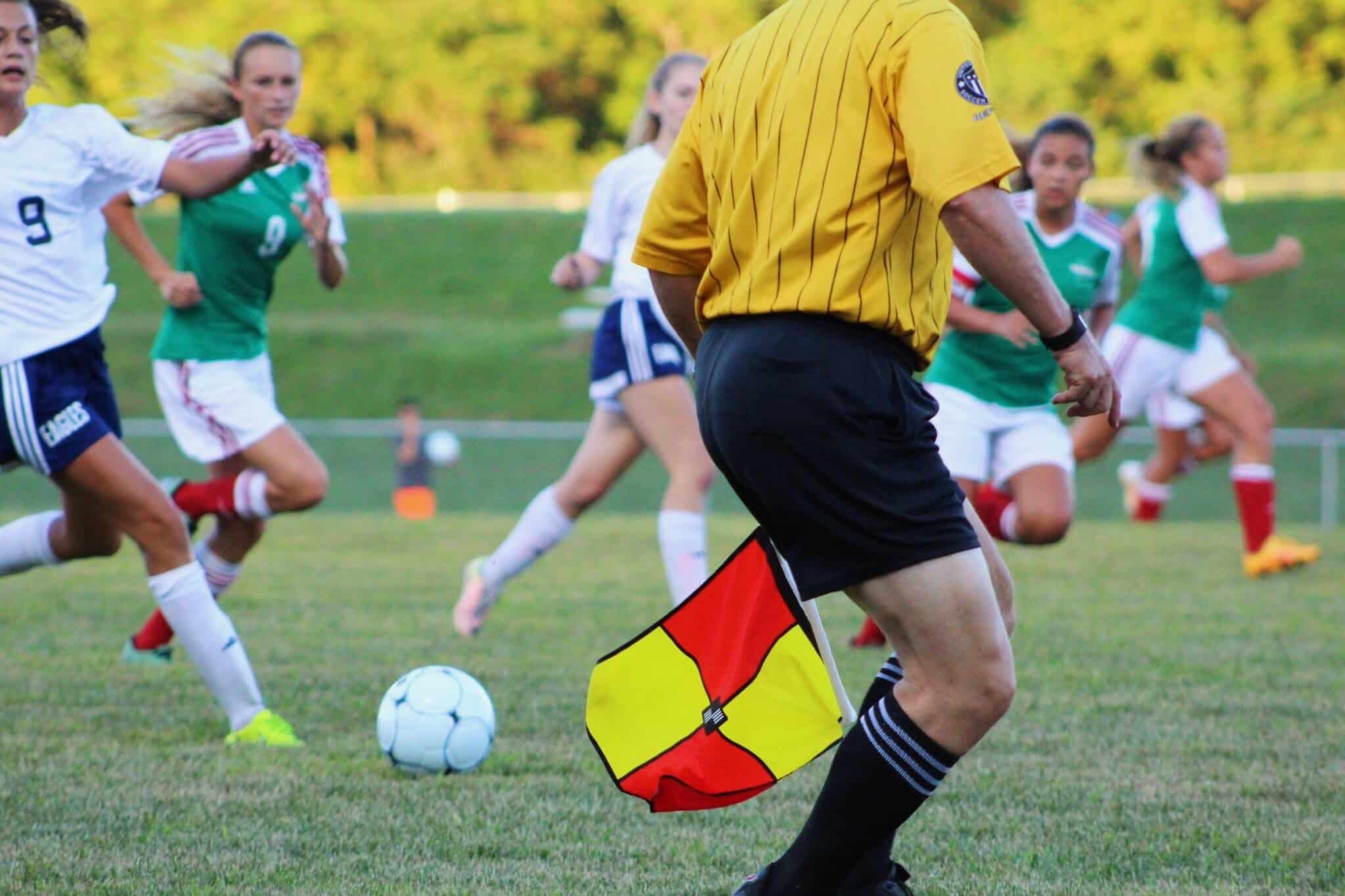
(noun) This is the person who runs up and down the football pitch (field). Their job is to tell the referee if the ball goes out. They’re also important when it comes to helping with offside decisions. In the past, this person’s job was called a ‘linesman.’
The assistant referee held up his flag to show the referee that the ball was still in play.
2. Attacker
(noun) The role of an attacker on a team is to score goals. Another word for an attacker is a forward.
3. Commentator
(noun) The person who reports every move of the game while it’s happening. If you’re a soccer/football fan, you’ve probably heard many commentators on TV or the radio.
John Motson is one of the most famous British football commentators.
4. Defender
(noun) A player who tries to stop the other team from scoring a goal.
England always does well in the World Cup matches because of their strong defenders.
5. Goalkeeper / Goalie
(noun) The player who stands between the goalposts and tries to stop the ball from entering the goal.
The goalkeeper for France dived to the ground and blocked Ronaldo’s shot.
6. Midfielder
(noun) A player who usually stays in the middle of the field.
Mesut Ozil is one of the best midfielders in the world.
7. Referee
(noun) The primary official responsible for enforcing the rules and ensuring fair play during a match.
8. Skipper
(noun/verb) The captain of the team. As a verb, to serve as the team captain. This term is used in British English.
John Terry was chosen to skipper the English side for the 2014 FIFA World Cup.
9. Striker
(noun) A player who shoots the goals.
10. Substitute (sub)
(verb/noun) To take one player off the field and replace them with another player. As a noun, it means the player who goes into the game to replace another player who comes out.
When Sir Alex Ferguson saw that his players were getting tired, he always substituted them.
The Rules of the Game
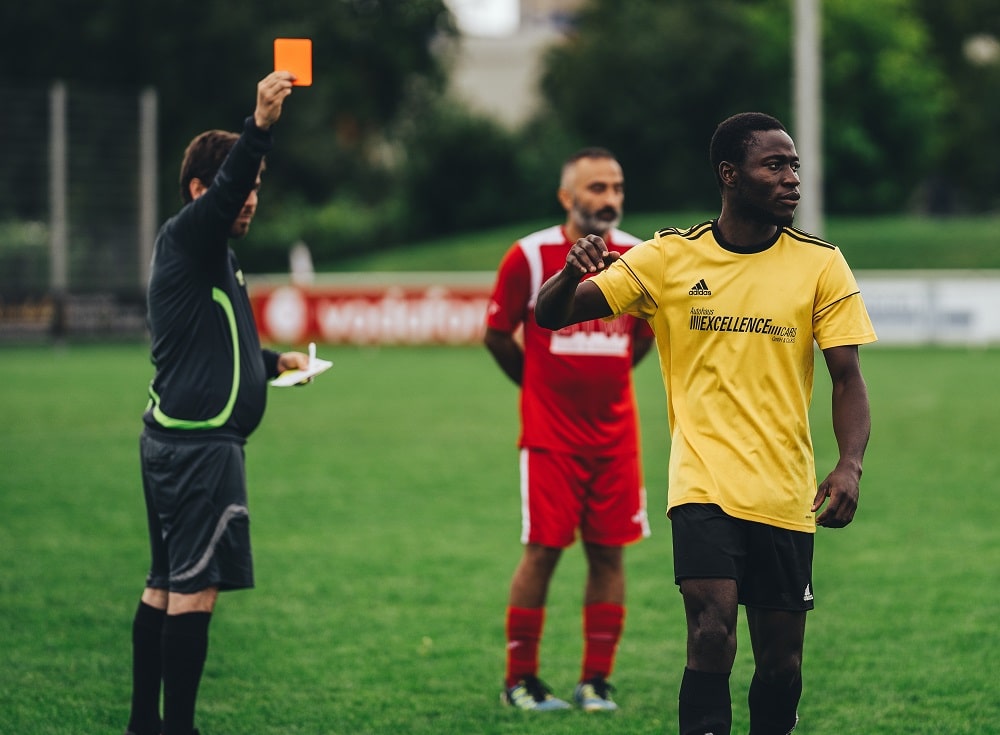
11. Advantage
(noun) The referee doesn’t always blow his whistle to stop the game when a foul has been committed. It may be unfair to the innocent team, so he lets the game continue.
The ref held up his hand to call advantage.
12. Booking
(noun) To be given a yellow card to show a serious foul.
After two bookings for fighting with the other team, Jonathan was sent off.
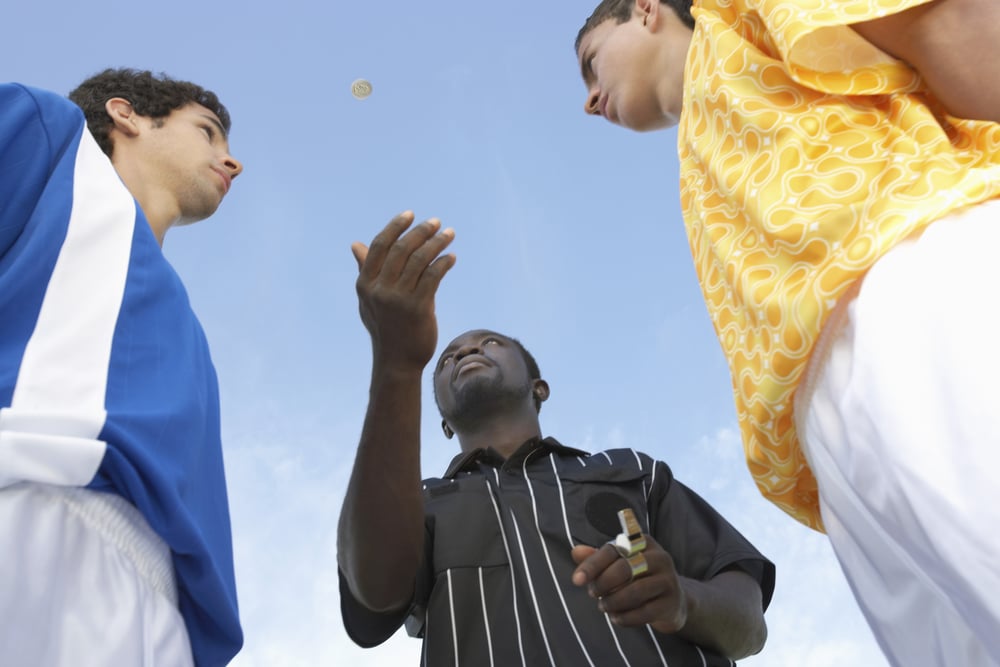
13. Coin toss
(noun) At the beginning of the match, the referee flips a coin to see which team has first possession of the ball. The team captain (usually of the away team) chooses heads or tails while the coin is in the air.
Jack’s team won the coin toss.
14. Corner kick
(noun) This is a free kick from any of the four corners of the pitch. It’s awarded to the attacking team when the defensive team’s player last touched the ball before it went out of bounds over the goal line without entering the goal. It’s sometimes just called a “corner.”
When the goalkeeper touched the ball, the referee awarded the other team a corner kick.
15. Dead ball
(noun) This is when the game is stopped and the ball isn’t moving. All free kicks and penalty kicks must be taken from a dead ball.
When the ball was dead, Luis ran up to the ball and booted it.
16. Extra time
(noun) An important game is made longer (extra time is added) when it finishes in a draw/tie. This is also called overtime .
They were lucky the game went into extra time because they ended up winning.
17. Foul
(noun) When a player does an illegal action such as touching the ball with their hands. They’re punished and the other team is awarded a free kick.
18. Full-time
(noun) When the final whistle is blown and the game is over.
The referee blew his whistle three times to tell everyone it was full-time.
19. Half-time
(noun) The short break after the first half of the game is played and before the second half starts.
The players and the coach discussed their strategy during half-time.
20. Handball
(noun) This is a kind of foul when a player deliberately touches the ball with his hand or arm.
21. Injury time
(noun) Extra time added to the game at the end of half-time or full-time if there have been any injuries during the game.
Because Barcelona had two injured players, the game went into injury time at the end.
22. Kickoff
(verb/noun) When the game begins.
Do you have any idea what time kickoff is?
23. Offside
(adjective/noun) A rule that states that when the ball is passed, there must be at least two defenders between the attacker from the other team and the goal line. If not, it’s considered offside and the player is punished.
24. Penalty kick
(noun) A direct free kick awarded to the attacking team when a defensive player commits a foul inside their own penalty area.
25. Penalty shootout
(noun) If the game is still drawn (equal points) after extra time, there’s a best-out-of-five penalty kick competition. The team with the most goals wins the game.
The fans went silent as they nervously watched the penalty shootout between the two teams.
26. Red card
(noun) A punishment given by the referee. If a player does something bad, they’re given a red card and sent off the field.
He was handed a red card for starting a fight with the other team and as a result, their team lost.
27. Spot kick
(noun) Another word for a penalty because the ball is placed in a certain spot (place).
Beckham placed the ball down in preparation for his spot kick.
28. Yellow card
(noun) The first warning that’s given to a player when they do something seriously wrong before receiving a red card.
Bale needs to be more careful when playing because he’s already been given one yellow card.
Actions During Gameplay

29. Bicycle kick
(noun) When the player kicks the ball backward over his own head.
Ronaldo is famous for his bicycle kick. When he does it, the fans go crazy.
30. Boot
(verb) To kick.
Torres booted the ball across the pitch to his teammate.
31. Header
(noun) To hit the ball with one’s head instead of their foot.
32. Mark
(verb) To mark a player means to guard them (play defense) to try and stop them from receiving the ball from their teammate.
The manager shouted out to his players to mark the opposition.
33. Pass
(verb/noun) To kick the ball to another player on your team.
Frank Lampard passed the ball to Beckham. Beckham kicked the ball and scored!
34. Pep talk
(noun) A short talk of encouragement from the coach or manager.
The players sat and listened to their coach give them a pep talk in the changing rooms.
35. Scissor kick
(noun/verb) When a player kicks his legs like a pair of scissors and passes the ball sideways.
Ryan Giggs scissor-kicked the ball skillfully to his teammate.
36. Shoot
(verb) To try and score a goal by kicking.
Ronaldo shot the ball right into the back of the net to score the winning goal.
37. Tackle
(verb) To try and take the ball from the opposite team using your feet.
38. Throw in
(verb/noun) When the ball goes out of bounds, a player takes the ball and throws it over his head to his teammates from outside.
Jake stood on the line and quickly threw the ball in to his teammate.
39. Wall
(noun) When the players of one team make a human wall by standing in a horizontal line to try and block a free kick.
The players made a wall as Lionel Messi went to shoot.
Parts of the Stadium

40. Bench
(noun) Where the substitute players sit. The phrase “on the bench” or “benched” means the player is not playing in the game.
Jack’s coach decided to keep him on the bench for being late to training.
41. Box
(noun) The penalty area around the goal.
The opposition formed a line in the box to try and block Messi from scoring.
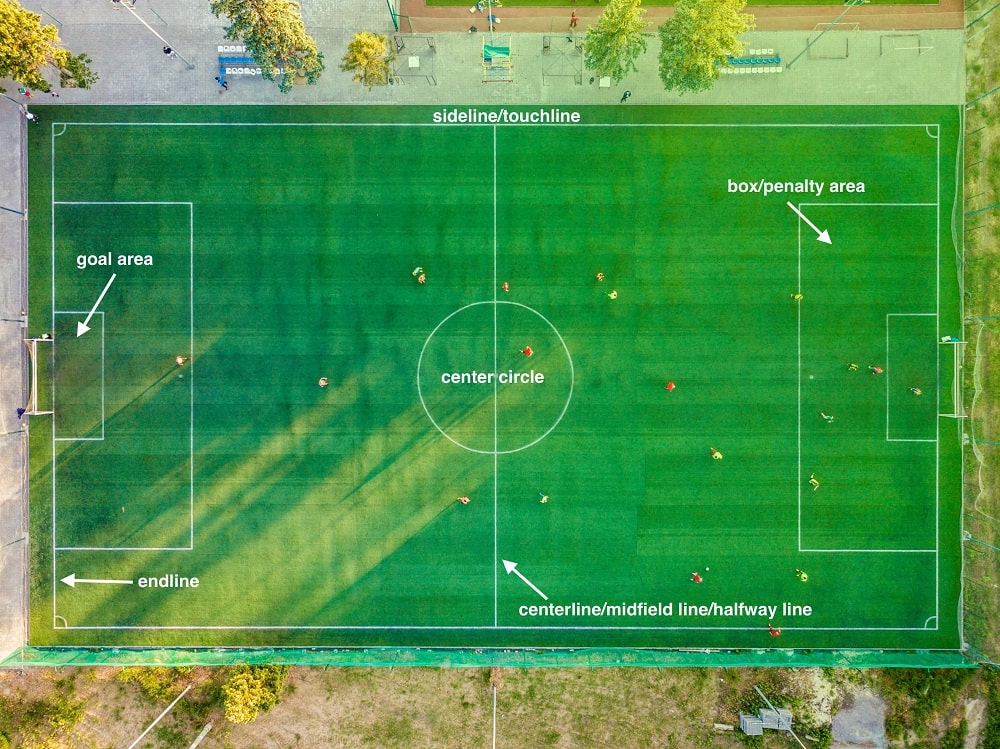
(noun) The area where the game is played. “Field” is used in American English while “pitch” is used in British English.
Because it had been raining for a couple of days, the field was muddy and difficult to play on.
43. Goalposts
(noun) The two vertical posts that make up the sides of the goal where the ball must travel through in order to score.
The striker’s powerful shot bounced off the goalpost, narrowly missing a goal.
44. Locker room
(noun) The area where teams meet and change into their football uniforms. Locker rooms usually have showers, bathrooms and lockers where the players can store their belongings.
The players sat in the locker room while they listened to their coach speak.
45. Net
(noun) The net is attached to the goalposts and crossbar and is made of mesh material or netting. It stops the ball when a goal has been scored.
46. Scoreboard
(noun) The board where the score (how many points each team has) and time left in the game is shown.
The time on the scoreboard shows there are only five minutes left of the game.
47. Spectator
(noun) A person who watches a game.
There weren’t many spectators at the game because of the rain.
48. Stands
(noun) Where the fans sit in the stadium. These are also called bleachers .
There was a lot of excitement in the stands as the fans cheered for their teams.
49. Touchline
(noun) The longest sides of the pitch. These are also known as sidelines .
The manager and coach stood on the touchline shouting out instructions to their team.
Scoring Vocabulary

50. Concede
(verb) When the goalkeeper allows a goal to be scored.
England’s goalkeeper was criticized for the number of goals he conceded.
51. Defeat
(noun) To suffer a defeat means to lose the match/game.
It was evident that everyone was upset when Atletico Madrid suffered defeat.
(verb/noun) When the final score is the same (e.g. 1-1).
The game ended in a draw, and the final score was 2-2.
53. Equalizer
(noun) When one player scores a goal and the score becomes equal (the same).
54. Goal difference
(noun) The difference in points/goals between the two teams. For example, team A scored 3 goals and team B scored 1 goal so the goal difference is 2.
55. Knock out
(phrasal verb) If one team knocks out another team, they beat them. After this, the losing team can no longer play in the tournament.
In the last World Cup, New Zealand was knocked out of the competition by Mexico.
56. The lead
(noun) If a team has the lead, then they’re winning at the moment.
At the end of the first half Real Madrid were in the lead, but Chelsea won in the end.
57. Own goal
(noun) When one player accidentally kicks the ball into their own goal.
The fans booed when John scored an own goal.
58. Score
(noun) The recorded number of goals that shows who’s winning the match.
I think the final score between Barcelona and Real Madrid will be 2-0.
59. Win
(verb) If a team wins the match, it means that they’ve scored more goals than the other team.
Soccer/Football Equipment
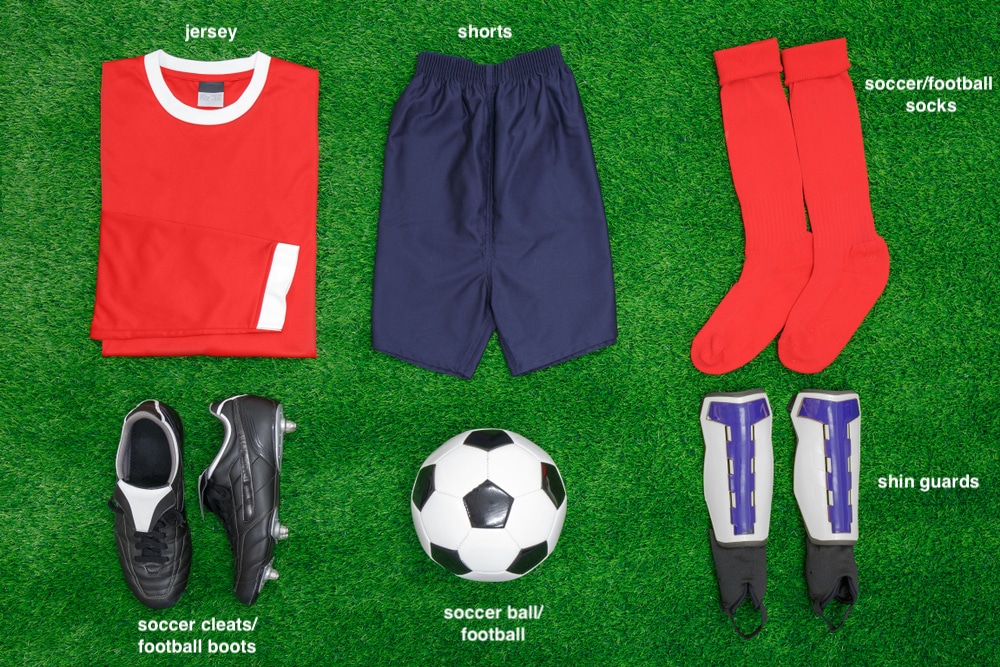
60. Cleats
(noun) Soccer cleats are special shoes with small spikes called studs (sharp things that stick out of the shoe) to help the players not slip. In British English, they’re called football boots .
61. Gloves
(noun) The goalkeeper wears special gloves on their hands to catch the ball.
62. Jersey
(noun) The shirt that the player wears. It usually has their name and number on it. Fans also wear jerseys with the names of their favorite teams and players.
63. Kit
(noun) A soccer or football kit refers to all of the gear that the players wear, including the uniform, cleats, shin guards, strappings, laces, etc.
The soccer team received new kits with their sponsor’s logo for the new season.
(noun) These are long socks that cover the players’ shin pads.
The team wore blue soccer socks to match the rest of their uniform.
65. Shin guards
(noun) These are plastic covers that protect a player’s shins (the bottom part of the leg’s front ) from getting kicked.
League and Game Structure
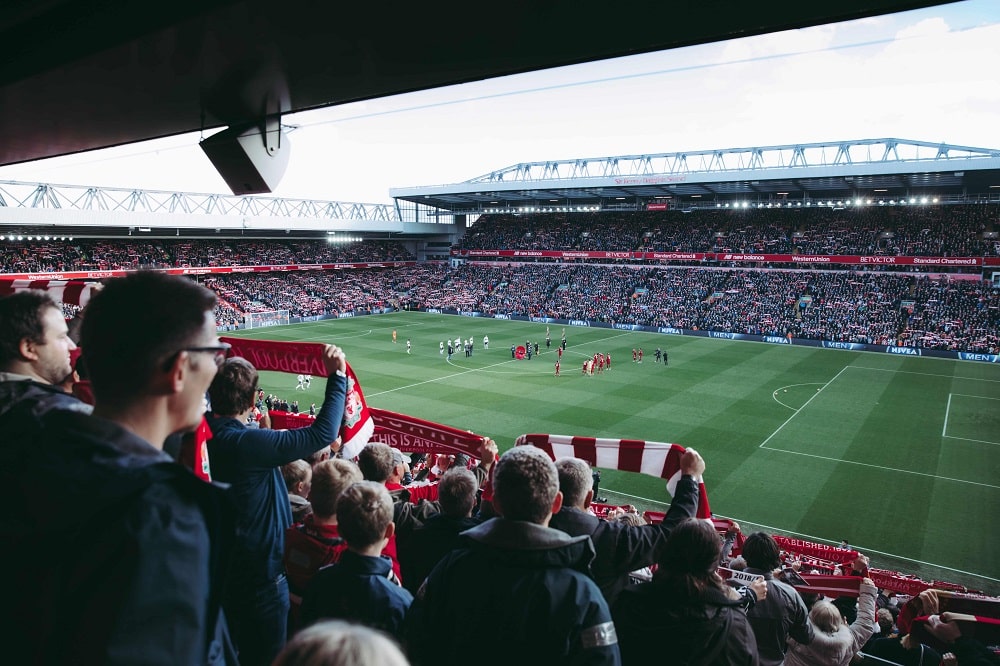
66. Away game
(noun) When the team has to travel to another team’s stadium to play the match. Opposite: Home game.
Philip hates traveling for away games. He always gets really tired and never plays well.
67. Home game
(noun) When the team gets to play in their own territory. Opposite: Away game.
Most teams perform better when they have a home game.
68. Match
(noun) Another word for a game (used more often in British English).
Who do you think is going to win the match?
69. Division
(noun) A division refers to a specific level or tier within the league system of a country’s soccer competition. Leagues are often organized into multiple divisions, with each division representing a different level of competition based on the teams’ performance, standings and promotion or relegation system.
All the top teams in the UK are in the premier division.
70. Fixture
(noun) Refers to a scheduled (planned) match or game between two teams.
All the World Cup fixtures are chosen out of a hat to make sure it’s completely fair.
(noun/verb) When a team does very well during a season, they’ll play in a higher category next time. This is called a promotion.
72. Rivals
(noun) Enemy/opposition. In sports, a rival refers to a team that competes against another team in a highly competitive and often intense manner. Rivals are typically closely matched in skill and performance.
Manchester United and Manchester City have been rivals for years.
73. Relegation / Relegate
(noun/verb) The opposite of promote/promotion. When a team does poorly in a season, they are placed in a lower division.
After having a lot of bad luck last season, Hull was relegated.
74. Transfer fee
(noun) When a player is sold to another team, they must pay some money called a transfer fee.
One of the highest transfer fees in football history was when Chelsea bought Fernando Torres.
Vocabulary for Soccer Commentary
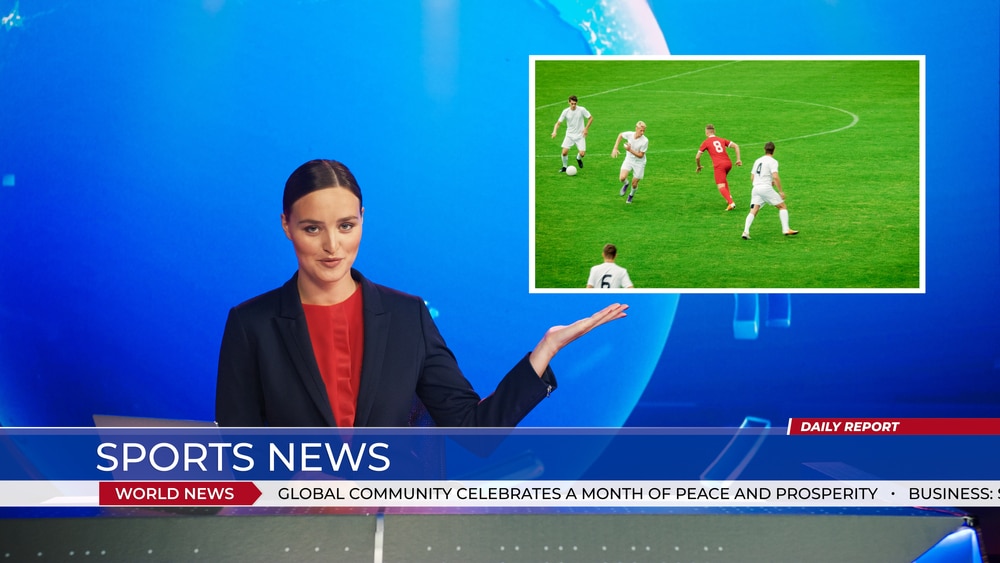
75. Broadcast
(noun/verb) When a live event on TV, online or radio is played.
Were you able to watch the live broadcast of the match between Brazil and Spain?
76. Clinical finish
(noun) A very well-controlled shot that results in a goal.
David Beckham is one of the most skilled players in history. He’s famous for his clinical finishes.
77. Keep possession
(verb) When one team plays well and has the ball more than the other team.
The Australia team is great at keeping possession, but they have difficulty scoring.
78. Long-ball game
(noun) This is when a team continues to kick long passes. A long-ball game can be very boring to watch.
Sheffield Wednesday is playing their usual long-ball game.
(noun) This phrase is used to show admiration for a team that successfully manages to pass the ball with only one touch.
As usual, the Spanish team is showing off their skills at one-touch football. Look at them go!
(noun) A player who’s very successful at scoring goals in almost every game.
Ronaldo is a prolific goal scorer; it’s almost guaranteed that he’ll score a goal in every match.
81. Put eleven men behind the ball
(idiom) This is an English expression that means a team is more interested in defending than scoring a goal.
82. Replay
(verb/noun) To show the video of a certain move in the game again to the TV viewers.
Let’s take a look at the replay of that fine goal scored by Lorrick Cana.
83. Underdog
(noun) The team that’s perceived to be at a disadvantage or less likely to win in a particular match or competition.
Vocabulary for Soccer Tournaments
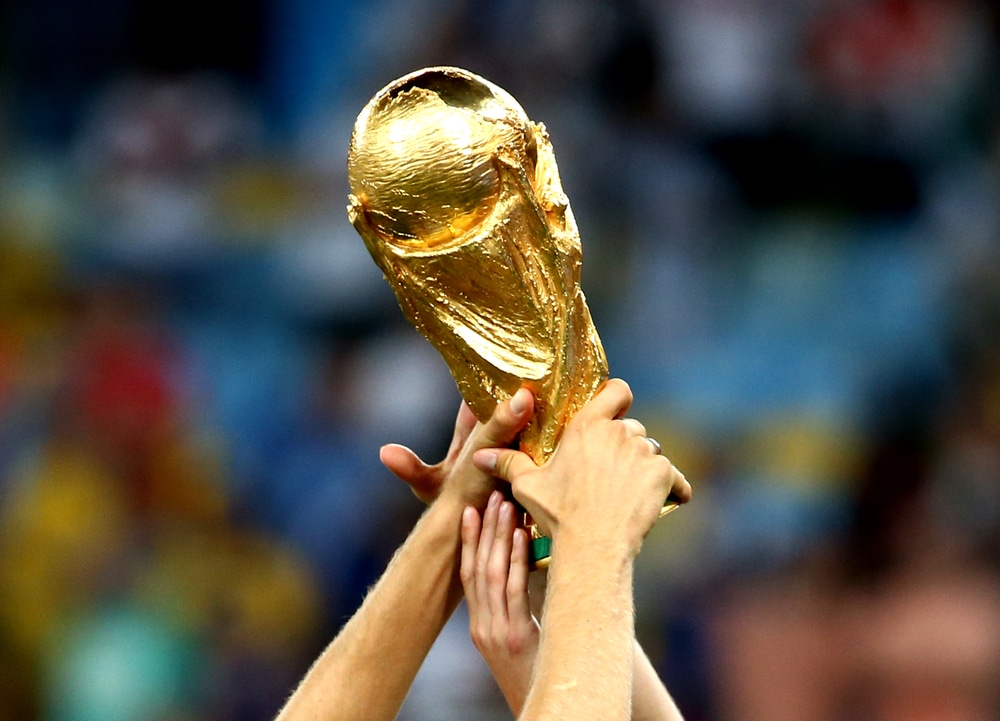
84. Fever pitch
(noun) An extremely high level of excitement in the crowd.
85. Group stage
(noun) The period/time of a tournament when the teams compete in groups to see who will go to the next round.
86. Host country
(noun) The country where an international event such as the World Cup or the Olympic Games will be held.
Russia was the host country for the 2018 World Cup.
87. National anthem
(noun) The official song of a certain country.
All players proudly sing their national anthem before playing an international match.
88. National team
(noun) A team that represents the country.
Spain has one of the strongest national teams in the world.
89. Knockout stage
(noun) A time of the tournament when teams are eliminated (no longer allowed to play) if they lose.
They can’t lose a game in the knockout stage. This is too important!
90. Qualify
(verb) To be able to score enough wins or points to compete in a tournament.
Italy didn’t qualify to compete in the 2022 FIFA World Cup.
91. Quarter-finals
(noun) The final four matches to see which teams will make it to the semi-finals.
There are some strong teams in this year’s quarter-finals.
92. Runner-up
(noun) The team who comes 2nd in a tournament.
Inter Milan was the runner-up in the 2022-23 Champions League.
93. Semi-finals
(noun) A round of two games to see which two teams are going to qualify for the final.
Every team plays their hardest in the semi-finals because it’s a great honor to reach the finals.
94. Sponsor
(noun/verb) A company or individual that gives money to a team or tournament in exchange for advertisement.
Coca-Cola was one of the official sponsors of the 2022 FIFA World Cup.
95. The finals
(noun) The final/finishing rounds of a tournament that include the quarter and semi-finals.
The finals of the 2014 Champions League were dominated by Spain and England.
96. The final
(noun) The last match of the tournament to see who the winner of the championship will be.
Manchester City and Inter Milan played in the 2023 Champions League final.
97. Trophy
(noun) The object (often a gold cup on a stand) that’s given to the winning team to recognize their achievement and success.
The team held up the trophy excitedly to show appreciation to their fans.
98. World Cup
(noun) The FIFA World Cup is an international soccer/football tournament held every four years. National teams from various countries compete to qualify for the tournament, and the final competition features 32 teams from different regions.
Brazil has won the World Cup more times than any other country in the world.
English Phrases to Talk About Soccer with Friends

Here are some English slang phrases or expressions that you can use with your friends while watching or playing a game together.
99. Get stuck in
To play hard with a lot of determination.
Look at those guys play! They’re really getting stuck in!
100. Have a lot of pace
To be quick.
Look at Jane go! She’s got a lot of pace, I’m impressed!
To say that a person is very skilled at kicking and scoring with their left foot.
102. Man on!
A warning that you can shout out to your teammate when another player is right behind them.
Jose screamed “Man on!” when he saw a player from the opposition behind Marcello.
To be able to block a ball that many people expected to be a goal.
Peter’s one of the best goalkeepers ever. He’s always able to pull off great saves.
104. Put it in the back of the net
To score a goal.
Sam is always able to put the ball in the back of the net. He scores most of our team’s points!
105. We were robbed!
You use this phrase when you believe the game was unfair.
The referee was totally biased and sided with the other team. We should have won but we were robbed!
Now that you know some English soccer vocabulary, you can talk to your friends or connect with other fans at sports bars around the world.
Print or bookmark this article and keep coming back to it. If you memorize a few words a day, you’ll soon know them all! You can also use FluentU to study these words—and many more—through native English videos.
FluentU takes authentic videos—like music videos, movie trailers, news and inspiring talks—and turns them into personalized language learning lessons.
You can try FluentU for free for 2 weeks. Check out the website or download the iOS app or Android app.
P.S. Click here to take advantage of our current sale! (Expires at the end of this month.)

And once you’ve mastered this vocabulary, you can check out even more English sports vocabulary for athletes and fans.
Download: This blog post is available as a convenient and portable PDF that you can take anywhere. Click here to get a copy. (Download)
And One More Thing...
If you like learning English through movies and online media, you should also check out FluentU. FluentU lets you learn English from popular talk shows, catchy music videos and funny commercials, as you can see here:
The FluentU app and website makes it really easy to watch English videos. There are captions that are interactive. That means you can tap on any word to see an image, definition, and useful examples.
For example, when you tap on the word "searching," you see this:
Learn all the vocabulary in any video with quizzes. Swipe left or right to see more examples for the word you’re learning.

FluentU helps you learn fast with useful questions and multiple examples. Learn more.
The best part? FluentU remembers the vocabulary that you’re learning. It gives you extra practice with difficult words—and reminds you when it’s time to review what you’ve learned. You have a truly personalized experience.
Start using the FluentU website on your computer or tablet or, better yet, download the FluentU app from the iTunes or Google Play store. Click here to take advantage of our current sale! (Expires at the end of this month.)










